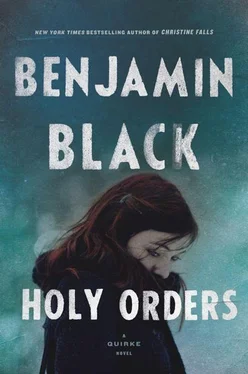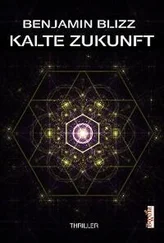He nodded, but at last had to look away. She was right, of course, everything she said was right; he just wished she would not insist on saying it, repeatedly. Perhaps he did not want to be happy. He had little talent for it, that was certain. Besides, happiness was another of those words, like love, the meaning of which he could never quite grasp. He wanted to tell her about his vision of the canal bank in the dark, how all evening since she had arrived he had kept seeing it, and how it filled him with mysterious longing. He wanted to make her understand, too, what a danger he was, what a menace, to those who came near him, who tried to come near him. But then surely she knew that. She had tried, however halfheartedly, to kill herself, for love of him; things that he touched tended to droop and die.
“I’m sorry,” he said. It was a thing he often found himself saying, although he was never sure what he was apologizing for. Everything, he supposed, everything that he was and did. It was a wearisome business, being himself. He would have liked a break from it, a holiday away from being who he was.
* * *
In the morning, a cobweb-colored sky cleared suddenly and the sun came out, spiking in at the side of the window where last night he had watched the moon. He had wakened with a start of nameless dread, the sun in his eyes and his heart thudding. Now he lay breathing, shallowly and slowly, righting himself. It was like this every morning, the waking into fright, then the relief to find that he was not at Carricklea but in his own bed, no longer a child, safe and unmolested. Isabel was up already; she would be in the kitchen, making breakfast. He stretched luxuriantly, yawning so hard the hinges of his jaws crackled. He would take the day off, perhaps, and they would go to lunch somewhere, the Russell, maybe, or—
“What’s this?” She was standing in the bedroom doorway, wearing his dressing gown, with a hand on her hip, holding up some brightly colored thing for him to see. An item of scanty underwear, perhaps, that she had bought to please him?
He sat up, rubbing his eyes and peering. What she had in her hand was a blue bow tie. She had given it to him as a going-away present when she left on tour. “I found it in the kitchen,” she said icily. “In the rubbish bin.”
Sergeant Jenkins drove them out to Rathfarnham. Quirke and Inspector Hackett sat in the back seat of the unmarked squad car, each looking out the window beside him. It rained at first and then abruptly stopped, and the sun came out and shone on the wet road and made a blinding glare on the roof of the car.
Quirke felt distinctly peculiar. It was as if he had a hangover, even though he had drunk no more than a few whiskeys the night before, first with Hackett and afterwards with Isabel. He wondered if he might be in for a dose of flu. His head seemed packed tight with cotton wool, and he had a sensation of being somehow separate from himself. He found himself welcoming the prospect of being ill — he would be glad of a day or two in bed, with a book and a bottle of Jameson. Isabel, however, would insist on taking care of him. He thought of her doing her Florence Nightingale act, making hot drinks for him and plumping up his pillows. He liked to be alone when he was sick. It was an opportunity to think, to assemble his thoughts, to reassess his life. He grinned briefly at his faint reflection in the window, showing his teeth. His life; ah, yes, his life.
“Funny about the garden,” Hackett said.
Quirke turned to him. “What?”
“The garden that Jimmy Minor had going, behind where he lived. I wouldn’t have thought of him with a spade in his hands. You never know people, do you.”
“I find that’s generally true, yes,” Quirke said drily.
The detective nodded, not listening. “I remember one of the instructors when I was at Templemore, the Garda training college there. ‘Lads,’ he used to say, ‘never jump to conclusions about a person until you know all the facts about him — and the fact is, you’ll never know all the facts.’”
“Words of wisdom,” Quirke said.
Hackett glanced at him sidelong, and said no more. He had long ago got used to Quirke and his unpredictable moods. He fixed his gaze on the back of Jenkins’s head and his translucent jug ears. He could not get the thought of Jimmy Minor’s scrap of a garden out of his head, the raised potato beds, the neat lines of seedlings, the cane tripods. It would be let run wild now, of course. In a year, two at the most, there would be hardly a sign of it left. It would be gone to wrack and dust, like the young man himself. He thought of time and its depredations and felt an inward shiver.
There was a metalwork arch above the gates of Trinity Manor, with a big wrought-iron medallion in the middle holding a blue-painted metal cross, and a legend underneath in Latin that he could not make out, except the word Trinitas . The house, away off at the end of a curving drive, amid flat expanses of lawn, was massive and gray. The trees, sycamores and beeches and the odd oak, were bare still, their branches etched in stark black against a sky of bird’s-egg blue and big pilings of silver-white cloud; looking more closely, though, with a countryman’s eye, Hackett spied the dusting of spring’s new shoots, soft green against the black bark. Contemplating all this, he felt nostalgic for the landscapes of his youth, the rolling fields, the river meadows, the wild woods. No: in all the years he had lived in the city he had never quite reconciled himself to it.
They pulled up on the gravel in front of the house. The blinds were half drawn on the big windows. There was a set of granite steps and a broad door painted navy blue, with a brass knocker. The house in the old days had been the residence of some British dignitary — the lord lieutenant, was it? No, his place was in the Phoenix Park. Somebody like that, anyway. How quick the priests had been, after the English went, to seize the best of what they had left behind. Hackett had not much time for the church, but he had to admire its relentless way of getting power and, having got it, the tenacity with which it held on to it.
Jenkins was told to wait in the car and the two men climbed the steps to the front door. Hackett glanced at his companion; had Quirke’s grayish pallor turned grayer? No doubt the very sight of a place such as this brought back harsh memories of his childhood and the institutions he had spent it in.
The door was opened by a tiny and very old man in a leather apron and a black suit that was shiny at the elbows and the knees. He was afflicted with curvature of the spine, and was so bent he had to squint up sideways to see them, baring an eyetooth in the effort. Hackett gave his name, and said he was expected. The old man replied with a grunt and shuffled backwards and to the side, drawing the door open wider, and the two men stepped into the hall.
The old man shut the door, pushing the weight of it with both hands. “This way, gents,” he said. His voice was a harsh croak. He turned and set off down the hall. As he walked he swung his right hand back and forth in long slow arcs; it might have been an oar and he the oarsman, paddling himself along. They could hear his labored breathing. The hall had a mingled smell of floor polish and must. All round them in the house a huge and listening silence reigned.
Father Dangerfield’s office was a large cold room with a corniced ceiling and three tall windows looking out on a broad sweep of lawn and, beyond the grass, a stand of stark-looking trees. The carpet had a threadbare pathway worn in it, leading up to an antique oak desk with many drawers and a green leather inlaid top. There was an acrid tobacco smell — Father Dangerfield was evidently a heavy smoker. He was narrow-shouldered, thin to the point of emaciation, with a narrow head and a pale dry gray jaw that had the look of a cuttlefish bone. He wore spectacles with metal rims, in the lenses of which the light from the windows weakly gleamed. He stood up as they entered — he was tall, well over six feet — and smiled with an evident effort, pursing his lips. The bent old man went out crabwise and shut the door soundlessly behind himself.
Читать дальше












